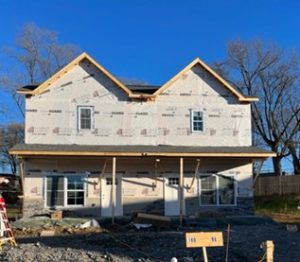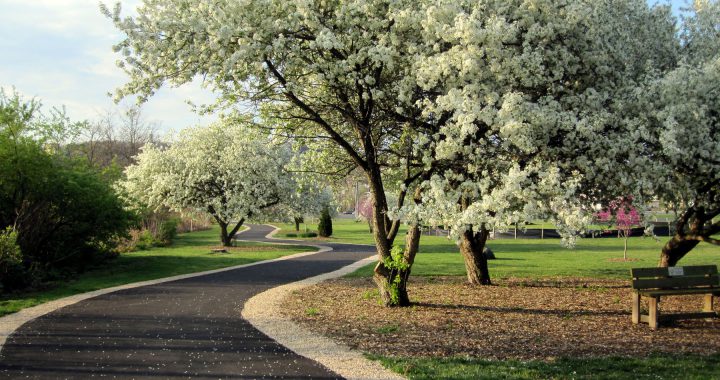News
PDC Housing Development Program Partners Continue Building in 2024
 The CSPDC’s PDC Housing Development Grant is nearing its three-year mark in June 2024, and the seven partners that were awarded a total of $1.66 million in gap funding for their affordable housing developments have made significant progress over the past year. Given delays caused by the COVID-19 pandemic and supply chain disruptions, the deadline to complete all projects has been moved to June 2025. Upon completion, the grant will result in the development of 58 new units of affordable housing in the Central Shenandoah region.
The CSPDC’s PDC Housing Development Grant is nearing its three-year mark in June 2024, and the seven partners that were awarded a total of $1.66 million in gap funding for their affordable housing developments have made significant progress over the past year. Given delays caused by the COVID-19 pandemic and supply chain disruptions, the deadline to complete all projects has been moved to June 2025. Upon completion, the grant will result in the development of 58 new units of affordable housing in the Central Shenandoah region.
CSPDC Assisting Waynesboro with South River Preserve Tree Planting
The CSPDC Chesapeake Bay Watershed Implementation Plan (WIP) program will be receiving nearly $300,000 through the Department of Environmental Quality (DEQ) to fund stormwater improvements for the City of Waynesboro’s South River Preserve Project. The funding will be used to replace five-acres of former industrial land and impervious surface along the South River with native tree and plant species to establish a floodplain forest and meadow.
Commonwealth Supply Chain and Logistics Survey Underway
The Commonwealth Center for Advanced Logistics Systems (CCALS), in collaboration with the Virginia Economic Development Partnership (VEDP), the State Chamber of Commerce, and the Port of Virginia, has launched a survey of the Commonwealth’s Supply Chain and Logistics ecosystem. The survey seeks input (opportunities/challenges) from BOTH providers of logistics (rail, truck, air, water, etc.) and those who rely on logistics (retailers, hospitals, manufacturers, energy, broadband, agriculture, etc.). Survey results will inform VEDP’s new logistics and supply chain programs/strategies, help guide policy initiatives, establish funding priorities, and advance projects along the way.
The initial survey is intended to be a high-level overview to inform and enhance logistics and supply chain conversations in Virginia. Follow-on analyses will likely be conducted to go deeper into regional results and industry-specific assessments, therefore statewide participation is strongly encouraged. The survey is being conducted by a multi-university team of five students – one from each of the CCALS’ member universities – VSU, VCU, ODU, UVA, and Longwood University.
More information and access to the survey can be found at: https://www.ccals.com/news/virginia-logistics-capabilities-survey/
2023 Virginia Farm to Table Conference Set for Dec. 12 & 13

The 2023 Virigina Farm to Table Conference is set for December 12 and 13 at Blue Ridge Community College’s Plecker Workforce Center. This year’s theme is “Nourishing and (Re)Imagining Collaboration, Conservation, and Community.”
Speakers and panelists will address and discuss regenerative agriculture, safety trauma, emotional ecology, drought resilience, managing pasture, the power of land and agency, community food webs and clusters, connections between soil health and human health, diversifying and stacking complementary enterprises, value chain connections, market development, local and regional food system development.
Learn more and register at https://tinyurl.com/2023VAF2TConfReg
DHCD Releases 2024 VATI Program Guidelines and Criteria
The Virginia Department of Housing and Community Development (DHCD) recently issued the 2024 Virginia Telecommunications Initiative (VATI) program guidelines and criteria. The primary objective of the VATI grant is to provide financial assistance to supplement construction costs by private sector broadband service providers, in partnership with local units of government, to extend service to areas that presently are unserved by any broadband provider. All parties interested in applying for the 2024 VATI program were required to submit a non-binding VATI Notice of Application by October 19 to communicate their intent to apply. Within the CSPDC footprint, the following localities met this VATI requirement: Augusta and Rockbridge counties. Applications for the 2024 VATI program are due December 19. Proposals received under this program (sourced from the state general funding) will be scored, governed, and administered under the 2024 VATI guidelines and criteria.
A separate, but related program to bring universal broadband access across Virginia continues to progress forward. The Broadband Equity, Access, and Deployment (BEAD) Program provides grant funding under the Infrastructure Investment and Jobs Act. The Commonwealth of Virginia is among the top 10 states to receive a BEAD allocation: nearly $1.5B. The BEAD program aims to expand high-speed internet access to unserved or underserved areas, businesses, and community anchor institutions. Access to DHCD’s Commonwealth Connect: BEAD Program Five-Year Plan, a strategy to bridge the digital divide, is available at the link below:
https://www.dhcd.virginia.gov/sites/default/files/Docx/vati/virginia-bead-5-year-plan.pdf
Application dates and deadlines for the BEAD program will be posted separately on the VATI website: https://www.dhcd.virginia.gov/vati.
Announcements
Please stay tuned for events and more information from the CSPDC.
Archives
- February 2025
- January 2025
- December 2024
- October 2024
- September 2024
- August 2024
- July 2024
- June 2024
- May 2024
- April 2024
- March 2024
- February 2024
- January 2024
- November 2023
- October 2023
- September 2023
- August 2023
- July 2023
- June 2023
- May 2023
- April 2023
- March 2023
- February 2023
- January 2023
- December 2022
- October 2022
- September 2022
- August 2022
- July 2022
- June 2022
- May 2022
- April 2022
- March 2022
- February 2022
- January 2022
- December 2021
- November 2021
- October 2021
- August 2021
- July 2021
- June 2021
- May 2021
- April 2021
- March 2021
- February 2021
- January 2021
- December 2020
- November 2020
- October 2020
- September 2020
- July 2020
- June 2020
- May 2020
- April 2020
- March 2020
- February 2020
- January 2020
- November 2019
- October 2019
- September 2019
- June 2019
- May 2019
- April 2019
- March 2019
- February 2019
- January 2019
- December 2018
- October 2018
- September 2018
- August 2018
- July 2018
- June 2018
- May 2018
- April 2018
- March 2018
- February 2018
- January 2018
- December 2017
- November 2017
- October 2017
- September 2017
- August 2017
- July 2017
- June 2017
- May 2017
- April 2017
- March 2017
- February 2017
- January 2017
- December 2016
- September 2016


